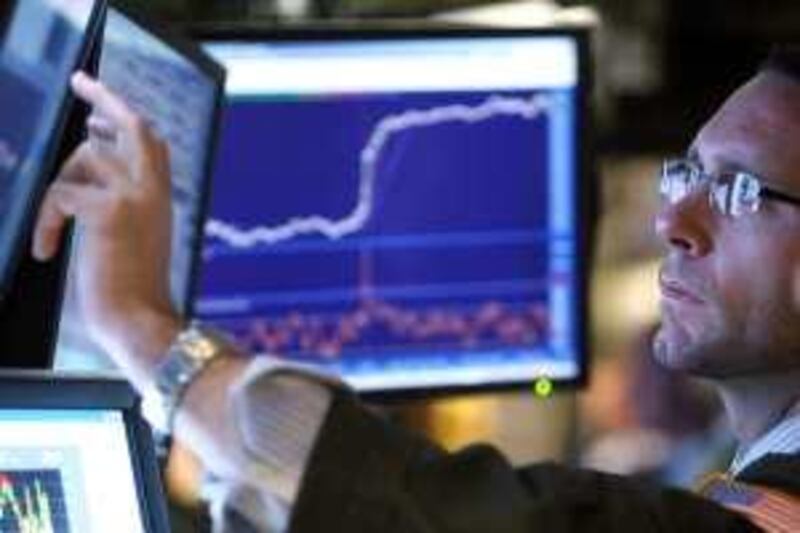WASHINGTON // Last winter, the threat of a massive economic collapse in the United States seemed all too real. The country was at the edge of an economic abyss, legislators warned, often invoking the Great Depression. Credit markets shut down, the stock market plunged and panic was palpable across the country, from big-city coffee shops to small-town diners. "The situation we face could not be more serious," cautioned President Barack Obama in February, during one of his many sobering assessments of the country's fiscal health. "If we don't act immediately ? our nation will sink into a crisis that, at some point, we may be unable to reverse." But six months later, at the onset of summer, much of that crisis atmosphere seems to have evaporated. Timothy Geithner, the treasury secretary, declared last month that the country has stepped back from the ledge and is now at the "beginning" of a recovery. "The national economy is showing some initial signs of stability," he said in a rare bout of optimism during a press conference near Boston. No one is ready to uncork the champagne just yet. Legislators and economists continue to point out that the economy is still contracting, only at a slower rate. But while at least some of the panic subsides, the result could be a huge gain in political capital for an already popular president. If Mr Obama is perceived by the American public as having steered the economy away from disaster - regardless of whether or not economists agree that his policies were ultimately the tool that fixed the problem - the goodwill could bolster his ability to take on other key issues such as healthcare and immigration reform while improving the Democratic Party's chances in upcoming elections. "If he pulls it off - and he's pulling it off right now - it's huge political capital for him and it will give him great latitude on a range of political issues," said Larry Berman, a political science professor at the University of California, Davis. "If Barack Obama's economic programme succeeds, it is inconceivable to think of the Republican Party becoming a majority for a really long time." Of course, the scenario works both ways. If the economy is slow to recover, that could harm Mr Obama's political fortunes. "This is the poker game he's playing," Mr Berman said. The president's recovery plan has included a stimulus plan of $787 billion (Dh2.9 trillion), which at one point he likened to a "blood infusion" to stabilise a dying patient. Mr Obama also has overseen an unprecedented intervention by the federal government into the private sector, giving Washington the authority to fire corporate executives whose companies received bailout money and set executive pay limits. So far, the "patient" is showing signs of improvement. The 700-point drops that panicked investors last autumn have given way to the ebb and flow of a more stable market. While the unemployment rate rose to 8.9 per cent in April - the highest level since 1983 - the pace of job loss slowed considerably over the previous month. Meanwhile, consumer confidence improved dramatically in April and new figures show that the gross domestic product shrank at a slower rate than was expected. US home sales figures for April, released yesterday, showed the biggest monthly jump in nearly eight years. "The consumer panic phase of the recession has largely ended," said Michael Englund, the chief economist at Action Economics in Boulder, Colorado. But Mr Englund and others caution that there are still more phases to go before anyone can claim victory. Ordinary citizens, he said, are unlikely to believe the recession is over as long as employment opportunities and investments by businesses continue to decline. "Even if the rate of collapse is diminishing, I think we are actually going to have to be two years or more into this before mom and pop say we fixed the economy," he said. They may not say it, but Republicans stand to gain the most from a slow economic recovery. They have described Mr Obama's policies with some of their sharpest rhetoric, calling his stimulus plan an example of "runaway spending" and decrying his "big government mentality". The Republican National Committee last month passed a resolution calling on Democrats to "stop pushing our country towards socialism and government control". For the time being, however, most Americans seem to disagree. Mr Obama's approval rating hovers at about 60 per cent, according to most polls. About two-thirds of the public also approve of Mr Obama's handling of the economy. sstanek@thenational.ae
Obama stands to gain massive political capital
Timothy Geithner, the treasury secretary, declared last month that the country has stepped back from the ledge and is now at the "beginning" of a recovery.

Editor's picks
More from the national





